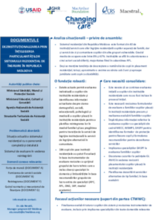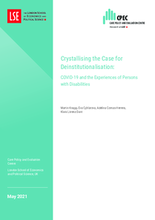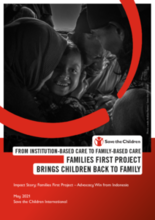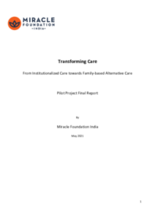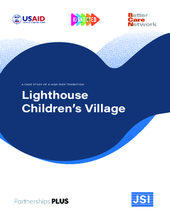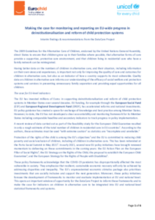Displaying 111 - 120 of 691
Research suggests that children develop best in families, but millions currently reside in residential care centers. Using a mixed methods design, the current study examined (1) antecedents to transition, (2) key elements in the process and (3) outcomes of transitioning models of care.
A fost efectuată o evaluare cuprinzătoare a copiilor și adolescenților care trăiesc în îngrijire rezidențială identificând că există un mecanism complex de evaluare, axat pe oferirea unei vederi de 360° asupra nevoilor și interesului superior al copilului.
Millions of persons with disabilities, children and older persons live in congregate settings. Whilst the motivation for providing such care may be well-intentioned, that is not always the case. Many of those settings are ‘institutional’, with residents denied autonomy and choice, provided with poor quality health and social care, and experiencing social isolation, neglect or abuse. This report summarises the evidence and experiences of persons living in congregate settings in general, and in terms of the impact of COVID-19, to understand the barriers to deinstitutionalisation, and to highlight the approaches that have sought to overcome those barriers.
Families First Project is a program initiated by Save the Children in Indonesia in collaboration with the Indonesian Government to promote a safe family environment for raising and caring for children, either in their own families or in family and community-based care alternatives.
This is the summary report for a pilot project spearheaded by Miracle Foundation India with its two partner organizations which were two Children's Care Institutions (CCIs) in the Indore District in central India. The goal of the pilot was to ‘create a replicable modal for other CCIs to effectively implement family based and alternative care through systemic change by engaging multiple stakeholders’.
UNICEF Bulgaria's project, "Family for Every Child," aimed to demonstrate that viable alternatives to institutionalization exist, and that as long as a network of suitable support services is in place, deinstitutionalization is achievable. UNICEF Bulgaria commissioned this evaluation to establish whether the project had been successful
With current knowledge of alternative child care and in light of the holistic ministry, this article suggests an approach for the Christian church to care for orphans and children at risk by focusing on the family and the local community.
Lighthouse Children’s Village was established in 2004 as a privately-run and privately-funded residential care institution. In 2014, its long-time principal donor made the decision to phase out of financially supporting institutional care. This case study highlights some of the early warning signs and subsequent discovery of unethical and criminal behavior that can sometimes be observed in a transition process.
Families over Facilities is a call to action to end the unnecessary institutionalization of children in child welfare. The report details the physical, mental and emotional harm done to children in group settings, the significant unnecessary taxpayer costs associated with the practice, and violations of children’s civil and human rights.
The DataCare Project seeks to map how EU Member States and the UK currently collect data on the situation of children in alternative care. This report presents the interim findings of this project, based on the analysis of 14 countries who participated in the study at the end of 2020.

